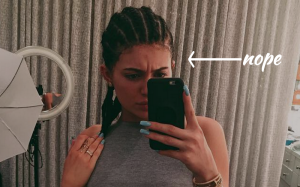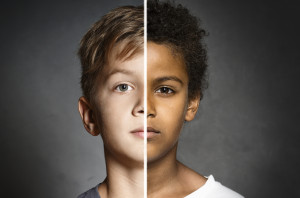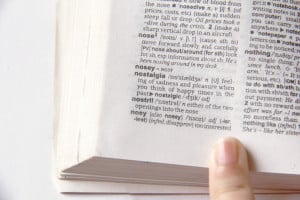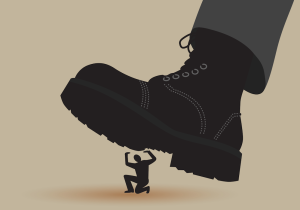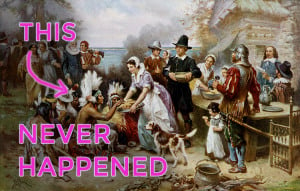Got questions about why people get mad when white folks wear traditionally Black hairstyles? Well, you’ve come to the right place – I’m one of those people who’s riled up about it, and I’ve got answers.
Many people are wondering about this topic after the most recent public example of Black hair appropriation: Kylie Jenner’s cornrows.
So maybe your first question is this: Why the hell do I care about what some teenager does with her hair?
Here’s your answer: This conversation isn’t just about hair. And it’s not just about Kylie Jenner. Her latest iteration of cultural appropriation is just a drop in the bucket that’s been filling up for centuries.
So if this seems to you like a trivial issue, don’t worry – we’re going to get to why it really matters.
But since this incident started this current conversation, here’s what’s going on with Kylie:
The white, younger sister of Kim Kardashian posted a photo of herself wearing cornrows.
Then, 16-year-old Amandla Stenberg (best known for playing Rue on The Hunger Games before becoming best known for inspiring widespread awe with her summary of cultural appropriation) made me applaud my computer screen once again. She pointed out exactly what’s wrong with this picture:
Jenner’s using her fame to call attention to her hair, which mimics Black culture, but not to the racist violence taking Black lives.
Then Justin Bieber defended Jenner – and the approving squeals of fangirls rang out ’round the world. Now, the public is weighing in.
I can’t believe I’m about to say this, but the Biebs has a point here. I don’t agree that Jenner should be free from responsibility for her wrongdoing, but he’s right when he says that she’s just one girl who made a mistake – and there’s a bigger picture we need to pay attention to here.
We can start by talking about her hair, but if that’s all we talk about, we’ll miss the chance to learn something valuable about how mundane actions, like the way you wear your hair, can make a huge statement about whether or not you value people of color who are struggling with the atrocities of oppression every day.
And you’ll still be left with questions, like why was this such a big deal? Let’s answer your questions.
This is what the uproar over appropriation of Black women’s hair is really all about.
1. “Why Can’t We All Just Be Equals and Share Our Cultures?”
I get it. I say I’m all about equality, but you think I’m pulling for the opposite – stating that only certain people should wear certain hairstyles based on skin color.
But there’s one major detail you have to think about when it comes to equality: the reality we live in.
It’s true that we’re “all human, whether we’re black, white, green, or purple.”
I’ve heard it all before, and it sounds pretty dandy – all being treated so equally that you can wear any hairstyle you want without harming anyone.
In a truly equal world, you wouldn’t have to think about if you have power and privilege over the people you’re borrowing culture from.
Unfortunately, that’s not the world we live in. In our world, systems of oppression create power dynamics between different groups of people.
In the United States, for example, white people get the unearned benefits of having the dominant culture.
And all of us – but especially women – deal with a dominant image of beauty that’s completely unrealistic. None of us are free from being body-shamed about all of the reasons our hair, body, teeth, or skin are not what someone else says they should be.
But for women of color, that unrealistic beauty ideal is even further out of reach.
The popularity of Eurocentric images says that being beautiful means being white, and that “normal” hair is fine and silky – nothing like my kinky natural African hair.
That type of hair is considered such a norm that mainstream stores don’t have products for me unless they’re selling the chance to change – to permanently alter my hair’s texture with straightening chemicals.
And institutional barriers discourage me from wearing my hair as it grows out of my head – I’m more likely to find and keep jobs if I meet standards of professionalism that often ban Black women’s natural hairstyles.
White women face sexism, and they may be oppressed in other ways, too – through ableism, classism, or fatphobia, for example. But when it comes to race, white women have more institutional power than Black women.
So while we should be treated as equals, we’re not. A white woman is free to take on and take off the same hairstyle that a Black woman would be ostracized for.
Until we correct that imbalance, then when Kylie Jenner wears cornrows, she’s acting on privilege and exploiting Black culture. She’s participating in a toxic norm that says Black people aren’t valuable, but our hair is cool – as long as white folks are wearing it.
That’s not okay. If she really thinks Black folks are cool and wants to honor our culture, she should help eradicate the inequality between us instead.
2. “What About When Black Women Straighten Their Hair?”
Since society treats white women as more valuable, Black women don’t have the same context when they make their hair look more like the dominant norm.
In the US, people have a variety of reasons for straightening their hair, but for many Black women, it’s a matter of survival, not just preference.
When you can’t find work unless you do it, you have to take such action to get by.
I can attest to how differently people treat Black women depending on the style of our hair. In one example from a lifetime of microaggressions, a high school teacher said my straightened hair looked “so much better than those knots” I usually wore.
I’d straightened it temporarily, for a school dance. My 15-year-old self was filled with the dreadful reminder that I’d be considered less beautiful when I returned to my twists – the “knots” he’d sneered about – after the style washed out in a couple days.
When a marginalized group takes on elements from the dominant culture in order to survive, that’s called assimilation.
It’s different from appropriation, when the dominant group takes from an oppressed group without respect for the culture they’re taking from.
I didn’t always know the word “assimilation,” but I’ve always felt the pressure of it. Like many other Black girls, I grew up with that pressure even within my own family, from my mother, aunts, and grandmother, who were harshly ridiculed for kinky hair.
In our family, the protective love women showed girls looked like teaching us that our own hair was ugly and unkept.
Even now, things are slowly changing from how it was for them and I’ve found work spaces open to my natural hair. But I couldn’t tell my aunties that – if I ever end up alone in a room with one of them, they’re bound to try to take a straightening comb to my head for what they believe is my own good.
That’s the lasting impact of the pressure to survive by fitting in with white culture.
A white woman who wears dreadlocks is acting on her privilege to have that hairstyle and still get by, and even to get positive attention for her hair.
Meanwhile, a Black woman with dreads gets treated like she’s inferior just because her hair doesn’t look like a white person’s. So she’s more likely to straighten it just to survive.
3. “Why Are You Trying to Limit Freedom?”
Maybe you’re stuck on the idea that if you’re a white person, you “can’t” wear your hair a certain way.
That hinders your freedom. And as big fan of liberation, I get why that feels fucked up. It’s your hair and you should be able to do whatever you want with it.
A lot of people think avoiding cultural appropriation means policing self-expression.
They say I’m calling for locking people up just for hurting feelings.
First, can I request that we ease up on the hyperbole when we talk about this? Because I’m not out to outlaw hairstyles, and we can refer to plenty of real-life consequences of cultural appropriation without exaggeration.
Cultural appropriation is never as simple as saying, “White people aren’t allowed to do X, period.” It’s about saying it’s ethical to consider the context of what you’re doing.
That includes learning about and giving credit to the true meaning of what you’re borrowing, instead of doing what Iggy Azalea does and gaining fame and fortune by imitating someone else.
It means recognizing where it came from, instead of doing what Elle UK just did and calling baby hair “a new trend” when Black women have been wearing it for decades.
It also means leaving something alone if you learn that it’s not possible to borrow it in a respectful way, like blogger HaifischGeweint did when they researched dreadlocks and decided not to wear them.
When people object to cultural appropriation, we’re not complaining for nothing – and it’s insulting to say that we are. Because we’re letting you know that even if you have harmless intentions, your impact is causing harm.
As the people who have to suffer through that harm, Black folks know what we’re talking about when we say that appropriating our hairstyles is fucked up. There’s a lot more at stake than limiting your “free speech” when you’re actually contributing to other people’s oppression.
4. “Where Do You Draw the Line? Why Are You Trying to Segregate People?”
One of the trickiest parts of cultural appropriation is knowing where to draw the line. People argue that we share between cultures all the time, which helps us grow as people.
And believe me, I know Black hair is gorgeous, so I appreciate that you want to appreciate it.
That’s why there’s a difference between cultural exchange – when people freely share appreciation for one another’s cultures – and cultural appropriation.
If people can share equally and benefit without harm, that’s fantastic.
But then some people start to wonder why we should draw lines between cultures – after all, we’re striving to be equal, right?
I’m not trying to divide us. But once again, let’s consider reality: when it comes to things like who gets more positive representation in the media, and who’s less likely to get killed by police, and who’s more likely to find employment, there’s a clear difference between me and a white woman.
The differences between us also include things that should be celebrated. Being Black comes with disadvantages in this society, like being profiled and stereotyped, but it also comes with things I love. I’m proud of my Blackness.
So when someone takes a piece of what my Blackness means to me, and puts it on like my identity is a costume, I feel like that’s all I am to them. Some minstrel show, some character, some two-dimensional stereotype of a person you can both mock and steal form.
It’s the ultimate form of objectification.
If you treat my look like something you can borrow when it brings you value and discard when it becomes useless, then you trivialize both my struggles and the beautiful things about what being Black means to me.
Think of it this way: It’s not segregation, but celebration. The problem is the unjust ways society treats our differences – not the fact that our differences exist.
5. “Are You Saying I’m a Bad Person If I Have One of These Hairstyles?”
It’s hard to swallow the idea that you could be causing harm when you don’t want to.
That’s why I’m not saying you’re a bad person, even if you’re guilty of appropriating another culture’s traditional hairstyle. I don’t know you or your intentions, and judging your character is not the point of pointing out how white supremacy shows up. In short, it’s not just about you.
Just like this conversation isn’t just about Kylie Jenner’s hair, cultural appropriation isn’t about saying any one individual person is evil. The point is to be aware of how systems of oppression show up in our everyday lives.
White supremacy is an example of a system. The media is an example of a structure that supports white supremacy, by showing positive images of white people and negative stereotypes of people of color. And you are one individual who consumes media, and acts on the ways they influence your view of the world.
So if you’ve ever thought a white girl with braids looked “quirky” and a Black girl with braids looked “ghetto,” that’s not a sign that you’re the One True Source of All Of White Supremacy.
But it is an example of how white people as individuals can participate in the system of white supremacy, and of how Black people can get hurt.
That’s why changing our everyday actions is a big part of creating change on a societal level.
6. “What If My Black Friend Says It’s Okay?”
Sorry, since cultural appropriation isn’t about one individual being a bad person, it’s also not about one individual person giving you a pass to do it.
Let’s be clear: Talking to marginalized people about their experiences with oppression is a good way to get perspective on issues they’re dealing with.
That’s not to say it’s a free-for-all for asking strangers questions and demanding answers. Nobody’s obligated to educate you, but it’s great if you have a friend who’s willing to to talk to you when you approach them in a respectful way.
But it still doesn’t mean their word stands for their entire culture.
No community is a monolith, and you could find a Black person who would say that appropriating our hair isn’t not a problem. They could honestly feel that way, or they could be feeling the pressure to agree with the dominant culture.
I wish I could give you the magical formula for what makes something offensive: Add the number of studies published on it + your number of Black friends, divide by the number of centuries this debate has raged on, sprinkle your intentions on top, and there you have it! Anything over 6 is wildly offensive.
It’s just not that easy. If one Black person says it’s okay, you have one person’s opinion, and that’s a start. But if you really want your answer, you also have to listen to other perspectives, learn about being an ally Black folks, and acknowledge your own privilege.
Once you commit to that process, you’ll understand a lot more about anti-Black racism – and you’ll know what’s at stake for Black folks if you appropriate our hairstyles.
7. “I Don’t Support Racism, So Why Is It a Problem If I Wear a Traditionally Black Hairstyle?”
This is often accompanied by “Don’t you have more important things to worry about?”
Okay, I can already hear people trying to call bullshit on my last point – it’s “just hair,” so what’s really at stake?
Well, let’s review the impact of some of the examples I’ve mentioned so far. When a white woman wears a traditionally Black hairstyle, she:
- Ignores the inequality of systematic racism, letting it remain invisible
- Distracts from the real issue of racism by leaving it up to people of color to point out the problem – so it’s about our “oversensitivity,” rather than institutional oppression
- Adds to the Eurocentric standard of beauty that says that Black women’s features are acceptable only on white women
- Claims profit, credit, and/or praise instead of the people of the culture she borrowed from
- Trivializes the struggles of the people who identify with that hairstyle
- Erases cultural differences that should be celebrated
- Perpetuates the system of white supremacy by reinforcing false ideas of Black women’s inferiority
That’s no small impact from one individual.
And when you think about lots of people believing cultural appropriation is okay, you can understand how this adds up to equal major problems.
Yes, we do have things more important than hair to worry about. I’ve touched on several of the important issues for Black women already – employment discrimination, lack of visibility in the media, police brutality – not to mention things like healthcare, reproductive justice, and intimate partner violence.
So if you’re wondering why I’d take any time away from these pressing issues to worry about hair, the answer is that you’ve just stumbled upon one of the realities of Black women’s everyday existence in the US.
We’re suffering and invisible. There are feminists who fight for women but won’t even acknowledge that our issues are worth fighting for. There are Black people speaking out against police brutality who don’t speak the names of Black women killed by police.
We’re told that we’re not beautiful, especially not when we look most like ourselves. Oftentimes, the same people who appropriate elements of our culture are completely absent when we need support.
And then we find a treasure that helps us challenge those abusive narratives, helps us recognize our value and be proud of our heritage, even after a lifetime of degradation. Even after being violently disconnected from our ancestors and having our history erased, sometimes directly through suppression of our natural appearance.
And that treasure is our own hair, which becomes more than just hair – we grow to understand that it’s one of the precious tools we can wield to help us affirm our worth and embrace our roots.
Even if you don’t contribute to these struggles, the fact is that Black women wrestle these conditions every day. If you agree that we deserve better, then respect us enough to let us decide for ourselves what we need.
Your everyday actions don’t exist in a vacuum separate from anti-Black racism, so if you don’t acknowledge the problem, then you’re part of it.
***
I hope this information clears up any confusion you had – not just about what Kylie Jenner’s done wrong, but about the bigger picture of why appropriation of traditionally Black hairstyles is harmful.
You’ll have more questions about how all of this applies to particular situations. But now you’ve got the key: applying context.
If you’re a white person cleaning your house and you toss your hair into braids to keep it out of your face, of course nobody’s going to arrest you for appropriating cornrows.
But if you happen to catch a glimpse of yourself looking quirky in the mirror and decide you’ll tell the world you invented braids to gain profit, try re-reading this article before calling your agent.
And if you’re thinking that technically the Norse, or technically the Vikings, or technically some pale-skinned ruler in 2000 BCE had dreadlocks first – again, consider the context. Who, in this society, gets the brunt of negative stereotypes about dreadlocks?
With what you know about why Black women’s hair matters, you can apply context to other situations of possible appropriation to figure out if what’s respectful and what’s oppressive.
There are no easy answers, but with some thoughtfulness and care, you can help improve the abhorrent ways our society treats Black women – instead of being part of the problem of making our lives more of a struggle just so you can have your fun.
[do_widget id=’text-101′]
Maisha Z. Johnson is the Digital Content Associate and Staff Writer of Everyday Feminism. You can find her writing at the intersections and shamelessly indulging in her obsession with pop culture around the web. Maisha’s past work includes Community United Against Violence (CUAV), the nation’s oldest LGBTQ anti-violence organization, and Fired Up!, a program of California Coalition for Women Prisoners. Through her own project, Inkblot Arts, Maisha taps into the creative arts and digital media to amplify the voices of those often silenced. Like her on Facebook or follow her on Twitter @mzjwords.
Search our 3000+ articles!
Read our articles about:
Our online racial justice training
Used by hundreds of universities, non-profits, and businesses.
Click to learn more


